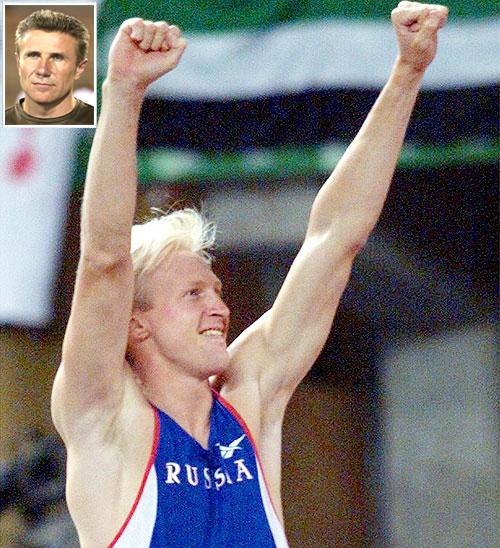
Bikash Mohapatra presents a few athletes who upset the odds (and the favourites) to take home the gold at the world's biggest sporting event.
Olympics are all about opportunity.
When an opportunity knocks, it needs to be grabbed by an athlete. While on most occasions big names justify the expectations and finish on the podium, there have been moments where the unexpected has happened.
Athletes not expected to win events have actually taken advantage of the opportunity, arising out of either an injury or underperformance of the favourites, to win gold. The 116-year old history of the modern Olympics is replete with examples of such athletes who have grabbed a chance with both hands.
From Italian Livio Berruti in Rome (1960) to New Zealand's John Walker in Montreal (1976) to Portugal's Carlos Lopes in Los Angeles (1984) to Greek Fani Chalkia in Athens (2004), there are ample such instances. For most of you the names mentioned above might be tough (rather impossible) to recall. However, also true is the fact that they are all Olympic champions.
In fact, for most of them, the Olympic gold is their lone claim to fame. (On second thoughts, if one has an Olympic gold what else does he need?)
Here are at a few athletes in recent history who have upset the odds (and the favourites) to take home the gold at the world's biggest sporting event.
Maksim Tarasov (Unified Team)
Pole vault in the latter part of the last millennium was all about one name – Sergei Bubka (inset). The Ukrainian (then representing the Unified Team), besides being a six-time world champion and the first person to clear six metres, also happened to break his own record on a number of occasions (he still holds the world record).
Bubka came to Barcelona as the defending champion – having won the gold in Seoul four years earlier. Palpably, he was the favourite. The challenge, if at all, was supposed to come from countryman Rodion Gataulin and South African Okkert Brits – the only two other vaulters to have cleared six metres back then.
Maksim Tarasov was nowhere in the frame.
However, in Barcelona Bubka flattered to deceive, failing to clear in his first three attempts. (For the record Bubka never won a second Olympic gold).
Tarasov got the chance and he grabbed it. He cleared 5.80 m and it was enough to win him the gold.
It was sheer irony that Tarasov failed to qualify for the Atlanta Olympics four years later, having been left out of the Russian squad after failing to clear the starting height.

Ellen van Langen (The Netherlands)
We stick with Barcelona; the event on this occasion being the women's 800 meters.
Liliya Nurutdinova of the Eunified team, who won the World championships in Tokyo in 1991, was the favourite to win the event. Cuban Ana Quirot was considered the main challenger.
Ellen van Langen was nowhere in the picture.
A few minutes later, though, the Dutchwoman had surprised all, probably even herself, to win the event ahead of both Nurutdinova (silver) and Quirot (bronze) – her timing of 1:55.54s remained a personal best.
Van Langen competed for six more years, albeit failing to match the high of Barcelona.
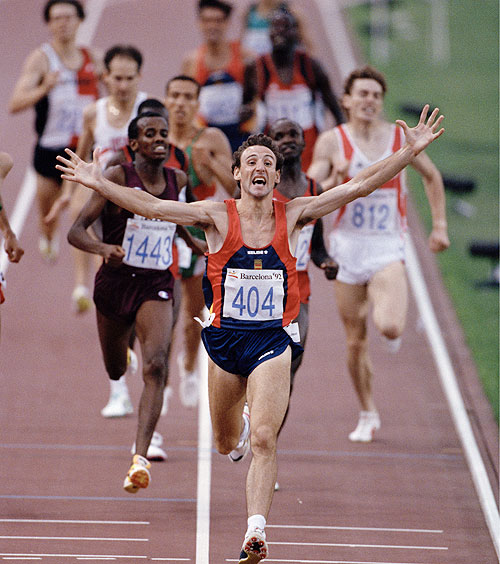
Fermin Cacho (Spain)
Fermin Cacho was consistent but certainly not the best. He was good enough to win medals but not good enough to win gold.
Coming into the Barcelona Olympics, Cacho had no major win to his credit. And despite being a Spaniard, he was not considered a favourite for the 1500 meters gold.
Noureddine Morceli was. The Algerian comfortably won his heats to justify the billing.
The 1500m final in Barcelona though was a disappointing one, with the athletes failing to match the timing of their women counterparts at the halfway mark. Adding to the disappointment was the fact that Morceli could finish only seventh. (For the record, he won the 1500m world record a month later)
And taking advantage of the Algerian's failure was the home favourite. Cacho ran a tactical race, positioned himself perfectly for the final stretch and raced home in 3:40.12s to win gold.
The gold medal in Barcelona remained the Spaniard's lone major international success though he won the silver at the 1993 World championships (in Stuttgart) and the Atlanta Olympics in 1996, losing to Morceli on both the occasions. Cacho won silver again at the 1997 World championships at Athens, behind Moroccan Hicham El Guerrouj.
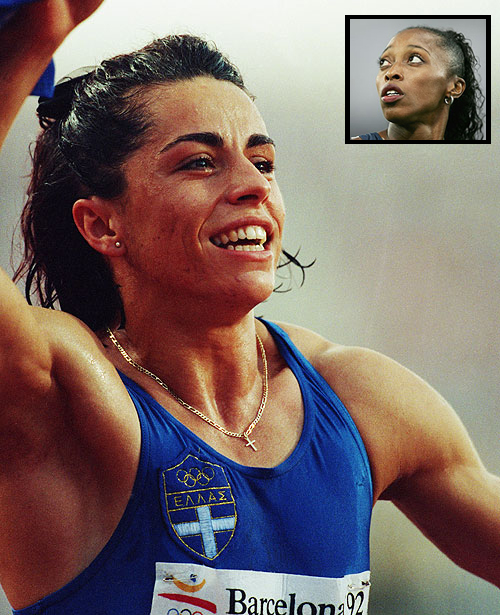
Paraskevi Patoulidou (Greece)
Her name is somewhat of a tongue twister. Also known as Voula, she came into the Barcelona Olympics as an outsider.
Already 27, she had no major success in her resume.
American Gail Devers (inset) was the favourite in the women's 100 meters hurdles. However, in reaching the final, Patoulidou became the first Greek woman to achieve the feat.
As she crossed the finishing line, setting her personal best (12.64 secs) en route which remains a national record, Patoulidou started celebrating what she thought was a silver medal. The replays increased her joy manifold.
Devers had tripped on the last hurdle and the woman from Greece won the gold.

Vebjorn Rodal (Norway)
In the mid-1990s, the men's 800 meters was dominated by one man, Kenyan-born Danish athlete Wilson Kipketer.
Since he had emigrated to Denmark before the Atlanta Olympics, the Kenyan federation blocked his participation in the Games, thereby ensuring the race was wide open.
Vebjorn Rodal, who had won bronze behind Kipketer in the World championships in Gothenburg a year earlier, was still an outsider.
However, the Norweigian overtook the field in his second lap, crossing the finish line ahead of South African Hezekiel Sepeng and Kenyan Fred Onyancha and with a new Olympic record (1:42.58).
The gold at Atlanta remained Rodal's lone international triumph. He couldn't defend his title in Sydney four years later, failing to reach the final.
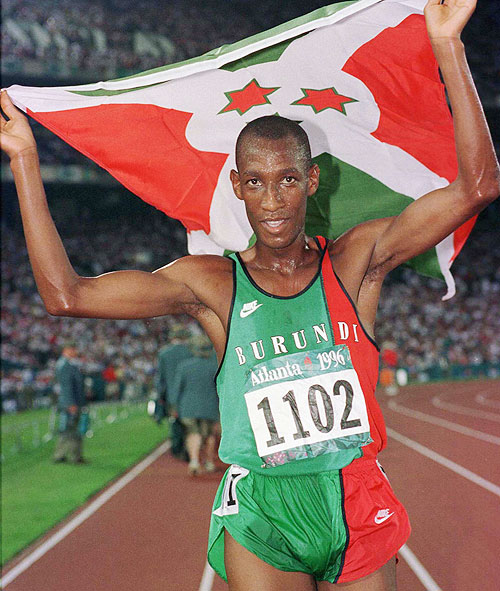
Venuste Niyongabo (Burundi)
Coming into the 5000 meters at the Atlanta Olympics, Venuste Niyongabo had competed only twice before in that event.
German Dieter Baumann, a gold medalist in Barcelona four years earlier, was the favourite to retain his crown. The Kenyans were supposed to provide the major challenge.
As it turned out, Baumann could only finish fourth, the Kenyans couldn't take advantage of the same and Niyongabo had won the gold medal.
He failed to add any other international title to his achievement in Atlanta.
However, to this date Niyongabo remains the first, and so far only, athlete from Burundi to win an Olympic medal, a gold at that.
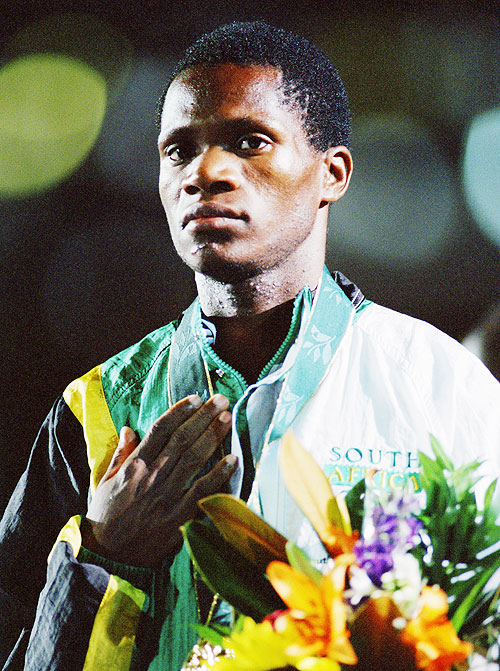
Josia Thugwane (South Africa)
For starters, Josia Thugwane is the first black athlete to win gold for South Africa at the Olympics.
He won gold in the marathon at the Atlanta Olympics in 1996.
Thugwane was fortunate to be able to compete in the Games. He survived a gun shot and a back injury ahead of the same.
However, in Atlanta, the South African upset everyone, including favourite Martin Fiz of Spain, to win gold.
That remained Thugwane sole international triumph, the South African failing miserably at his attempt at defending his title in Sydney four years later.
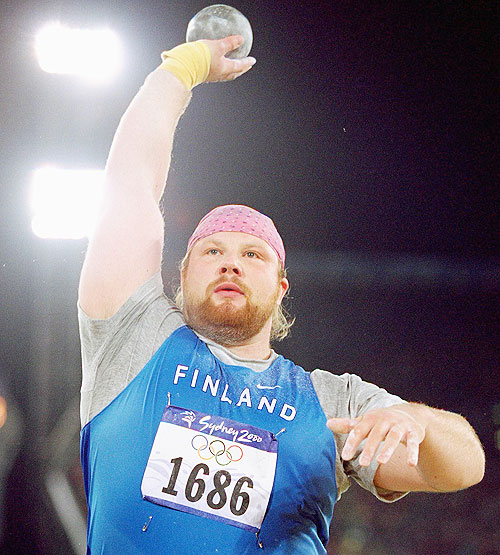
Arsi Harju (Finland)
Shot put and a Finnish athlete don't make a good pairing!
When it comes to field events, the Nordic country has a history of doing well in javelin. However, in shot put its record doesn't speak much.
Arsi Harju is an exception though.
The Kurikka-born athlete won gold at the Sydney Olympics in 2000 with a throw of 21.29 meters.
Prior to final, he also set a personal best (21.39 m) in the heats.
The triumph in Sydney remained Harju's major international success.
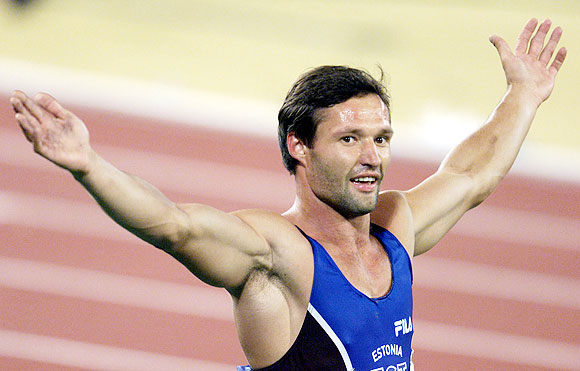
Erki Nool (Estonia)
Czech Roman Sebrle was the main contender for the decathlon gold at the Sydney Olympics. American Chris Huffins was the main challenger.
Estonian Erki Nool was nowhere in the frame. Neither did he win any of the 10 events.
Yet Nool walked away with the gold, even if it was in a controversial manner. The referee overruled the judge at the discus event and made the Estonian's final attempt valid.
Though there were protests thereafter, Nool was celebrating his gold medal win.
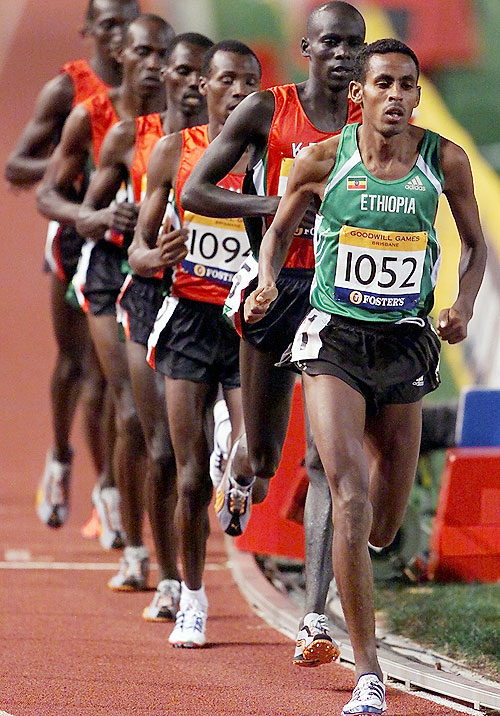
Million Wolde (Ethiopia)
Ethiopians are generally good at long distance races, so much so that they can't be counted out before a race.
Million Wolde's credentials coming into the 5000 metres event at the Sydney Olympics was nothing to boast about.
The Ethiopian had finished a disappointing eighth at the World championships in Seville a year earlier.
However, in Sydney Wolde defied all odds and won comfortably.
That triumph remained Wolde's lone win at an international level even though the Ethiopian came close at the world championship in Edmonton (2001), finishing second.